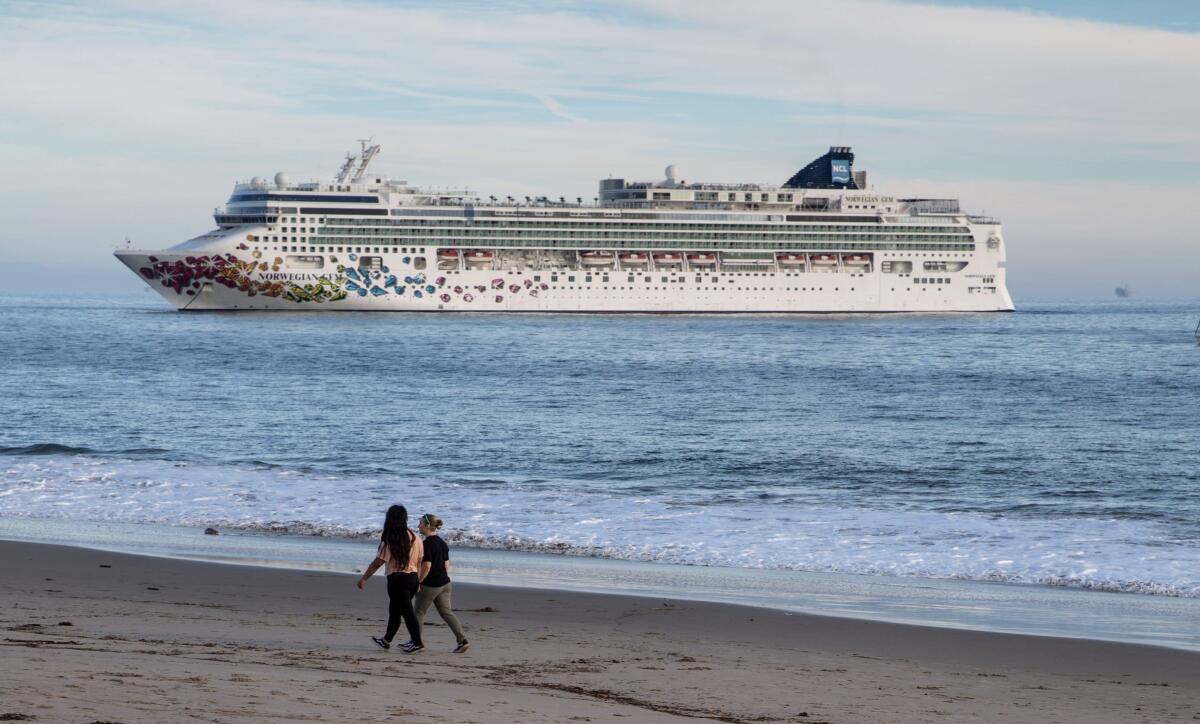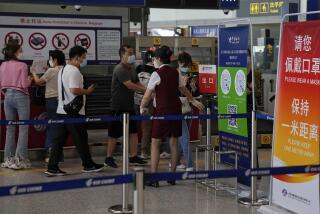Royal Caribbean eases coronavirus restrictions but Norwegian holds firm

Royal Caribbean Cruise Line backed off from last week’s strict policy arising from the coronavirus outbreak, saying passengers who have passports from China, Hong Kong or Macao are no longer barred from boarding.
The cruise line said it changed the policy in response to travel restrictions imposed by governments that oversee the ports where the ships dock. Health concerns had previously caused Royal Caribbean to impose the strict policy, but “now that these governmental restrictions have been clarified, we are able to clarify our own policies,” the company said.
Meanwhile, Norwegian Cruise Line, the world’s third-largest cruise company, said it continues to prohibit any passenger or crew member who holds a passport from China, Hong Kong or Macao from boarding its ships.
A post on the Norwegian Cruise Line website over the weekend suggested that the cruise company had dropped its restriction on crew members with such passports. But Norwegian said Monday it had not changed its policy, and subsequently changed its website back to the original wording concerning restrictions, saying its top priority is “the safety, security and well-being of our guests and crew.”
The cruise line restrictions were criticized by the civil rights group Asian Americans Advancing Justice, saying it is unfair to impose a prohibition on people simply because they hold a passport from a country or region.
“Saying a nation with 1.4 billion people should all be treated the same does seem like a very oversimplified response to a very complicated situation,” said John C. Yang, president and chief executive of the Washington, D.C., affiliate of the group.
The passport rules appear to be the most restrictive in the cruise industry.
The Cruise Lines International Assn., a trade group for the world’s cruise industry, said in a statement that its members have adopted policies that deny boarding to passengers who have been to China, Hong Kong or Macao or in contact with someone suspected to have the virus in the previous 14 days. A representative for the trade group could not be reached for comment Monday.
Asked to respond to the restrictive coronavirus policies, the American Society of Travel Advisors declined to criticize the companies, saying in a statement: “We believe our cruise partners are in the best position to make decisions for the safety of their passengers and employees.”
The coronavirus outbreak has infected more than 40,000 people and killed more than 900, mostly in the Wuhan province of China where the outbreak originated, according to the World Health Organization.
In contrast to the more restrictive policies of other cruise companies, Carnival Cruise Line, the world’s largest cruise company, does not restrict people from boarding based on their passports. It has said it will prohibit travelers from boarding its ships if they have traveled to, from or through China, Hong Kong or Macao in the 14 days prior to their ship’s scheduled departure.
The incubation period for the virus is believed to be 14 days.
Royal Caribbean has also adopted a policy of denying boarding to any passenger, regardless of nationality, who has been in China, Hong Kong or Macao in the 15 days before the departure of a cruise ship. Norwegian is denying boarding to any traveler who has visited China, Hong Kong or Macao in the 30 days before the cruise.
Many of the world’s cruise lines, including Norwegian, have also canceled or postponed trips that call on ports in mainland China.
The outbreak has already prompted the quarantine of passengers on at least two ships and led other cruise companies to implement new health regulations for their passengers.
The effects of the outbreak on the cruise industry could be substantial, considering that cruise companies have in the last few years turned their attention to China to try to attract its estimated 83 million potential cruise customers.
More to Read
Inside the business of entertainment
The Wide Shot brings you news, analysis and insights on everything from streaming wars to production — and what it all means for the future.
You may occasionally receive promotional content from the Los Angeles Times.











